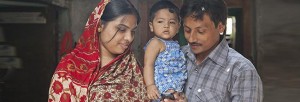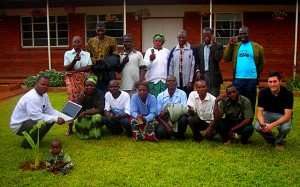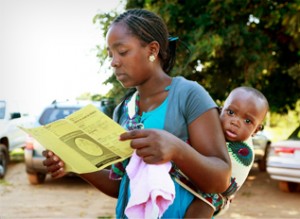When you learn you are pregnant, especially that first time, what is one of the first things you do?
I can tell you what I did. I turned to the internet for information and what site is a newly pregnant woman’s best friend other than Baby Center?
So now imagine your life without those weekly emails telling you that your baby is the size of a grapefruit or plum.
Imagine not only having no access to that information but imagine having no real access to any information at all because, well, you can’t read.
About two weeks ago, I spent a few days as a Fellow at the UN Foundation’s Shot@Life Social Good conference and honestly, I haven’t stopped thinking about all that I learned. I’m describing many women in Bangladesh in the above scenario. But that’s just one example of what we learned. The reality is, there are millions of women around the world with little to no access to factual medical information about their pregnancies or how to care for their babies but mobile phone technology, in particular, is changing that. Just as there are hundreds of thousands of children struggling to make it to their 5th birthdays without access to life-saving immunizations.
What’s remarkable is meeting and listening to just some of the people working hard to change all of the above.
First, with women. During the conference, we heard from Carla Koppell, who aside from having the title I totally covet, Senior Coordinator for Gender Equality and Women’s Empowerment at USAID, really enlightened us. She noted that child and maternal health is the biggest investment of USAID. #DidYouKnow?
Even further, despite the fact that Americans commonly believe that anywhere from 10-25% of the federal budget goes to foreign aid, really that amount hovers around a mere 1%. Ms. Koppell went on to explain that robust economic growth in developing countries and women’s development go hand-in-hand. This should shock none of us – women’s empowerment is essential to the development of a community. Turns out that women in developing countries will reinvest up to 90% of their income back into their family and their community and for men – that figure is about 25%. And for every additional year a girl goes to school, she decreases her unwanted children by 2.2. We learned that women leaders can be our greatest advocates – again – is anyone shocked? Ms. Koppell gave an example of how women in parliament in Uganda blocked their country’s budget until health clinics were funded. Wouldn’t it be inspiring to see the women in Congress this year band together to block something that benefits women and children?
And further, she drove home a critically important point – one that I believe is just as true in the United States as it is anywhere else – that gender equality must also address men and boys. For example, boys are falling behind in education in Latin America, which increases their chances of violence.
Another fun fact – this one from Victoria Esser of the State Department….the State Department tweets in 11 different languages. That is just cool.
One of my favorite speakers was Kirsten Gagnaire, Global Director of the Mobile Alliance for Maternal Action (MAMA). MAMA is a private-public funded organization and one of their slogans is “Mobile Messages put the power of health in every MAMA’s hand.”
#DidYouKnow that mobile technology is educating women around the world?
Essentially, MAMA recognized, in part under the leadership of former Secretary Hillary Clinton, that approximately 1 billion women in low and middle-income countries own mobile phones. And if a pregnant woman herself doesn’t have access to a phone, someone she knows does, be it her husband, her mother-in-law, etc. Add to that these facts about the prevalence of mobile phones: every day there are 1,000 women that do not survive child-birth or pregnancy, 2 out of every 5 children die during the first month of life. And about 21 children each minute die every day mainly from preventable causes.
#SorryIfThisDepressesYou
So enter MAMA – this organization is empowering women to make health decisions for themselves and their babies through mobile phone messages. Instead of logging on to their email accounts and receiving the weekly Baby Center update, these women can receive voice messages via cell phone. In the specific example of Bangladesh – not only did MAMA learn they need to develop voice messages for the pregnant women but they needed to respect the culture and also develop messages for husbands and mothers-in-law.
Stop for a minute.
Can you imagine that one? Relying upon only your mother-in-law to receive factual information about your pregnancy?
I’ll let you think about that for a minute. I had a few days to mull that one over. Frankly I still haven’t let it go.
Ms. Gagnaire showed us this short two-minute video of how mobile messages have women in Bangladesh and I highly recommend viewing it just for some perspective. The woman featured is a loving mother just like any of us – except she is hungry to learn – and is just now getting access to real information. Until she started receiving these messages, she didn’t know that it’s good for her baby starting around 3 months for her to make eye contact with the baby. These are women who aren’t fretting about whether they are helicopter parents or if their baby will get into your top choice preschool or adjust well to a big-girl bed – they are just trying to get through the day and keep everyone alive and healthy.
#KeepItAllInPerspective,Everyone
Ms. Gagnaire opened her talk with noting that in many countries, information on pregnancy and motherhood is based on myths.
Now let’s shift gears to the kids. What I have long admired about the UN Foundation’s Shot@Life campaign is that motivating others to advocate and donate on behalf of immunizing children not only saves a child’s life but it also saves a mother – none of us want to even consider a world without our kids in it. #DidYouKnow that according to Shot@Life, some moms walk as far as 15-miles to reach life-saving vaccines for their kids? Two of the most common causes of child death – pneumonia and diarrhea – can be largely prevented by existing vaccines. Expanding access to vaccines can prevent an additional 1.5 million deaths each year. You can participate by being an advocate, emailing your Member of Congress, or just donating a small amount — the Shot@Life campaign makes it so easy, just click here.
Finally — I have barely covered the surface of all that we learned during this conference – but I wanted to leave you with one more thing. If you are at all interested in the power of how mobile phones are transforming access to health overseas, then you can help too by donating your old phones to Hope Phones. This charity was founded by an enterprising man who as a young college student realized that mobile phones are helping people in the developing world. You can print a mailing label from your own home, mail in your old phone at no cost to you, then Hope Phones ensures it is recycled properly and then transfers the value of the parts of your recycled phone into funds to provide health workers in communities overseas with phones. From the Hope Phones site: if we can recycle just 1% of disposed phones each year, we can outfit 1 million health workers, improving the lives of 50 million people.
I hope you found today’s “Did You Know” themed post interesting and informative. Please keep these organizations in mind when you consider donating to a good cause. And as always, I’d love for you to “Like” the Wired Momma Facebook page.











